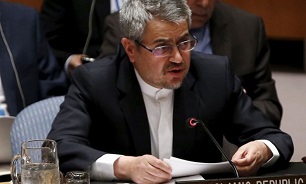Iran Strongly Rejects US Evidence on Missile Aid to Yemen as Fabricated
 "As part of the baseless allegations raised by the US administration against the Islamic Republic of Iran throughout the last 10 months, the US ambassador accused Iran of supplying missiles to Yemen once again; a baseless allegation that we categorically reject," Iran's Envoy to the UN Gholamali Khoshrou said.
"As part of the baseless allegations raised by the US administration against the Islamic Republic of Iran throughout the last 10 months, the US ambassador accused Iran of supplying missiles to Yemen once again; a baseless allegation that we categorically reject," Iran's Envoy to the UN Gholamali Khoshrou said.
"We believe this is a clear indication of the destructive, provocative and irresponsible role of the United States," he continued, and added, "This purportedly evidence, put on public display today, is as much fabricated as the one presented on some other occasions earlier."
"The US government has an agenda and is constantly at work to deceive the public into believing the cases they put together to advance it," the ambassador said, stating that the accusations leveled by Haley were intended to divert attention from the devastating war in Yemen being led by Saudi Arabia.
"These hyperboles are meant to cover up the United States' adventurist moves in the Middle East, including its unharnessed and cruel back-up for the Israeli regime," he said.
Haley told a news conference in Washington that a missile fired at Riyadh airport by the popular Ansarullah Movement on November 4 was Iranian-made.
"It was made in Iran then sent to Houthi militants in Yemen," Haley said.
A confidential report to the council this month said UN officials had examined debris from missiles fired at Saudi Arabia there was no firm conclusion on whether they came from an Iranian supplier.
UN Secretary-General Antonio Guterres on Wednesday said in a report on Iran's compliance with UNSC Resolution 2231 that accompanies the Iran-Powers nuclear deal that there was no proof to implicate Iran.
Haley has called on the UN Security Council to take a tougher stance toward Iran, accusing Tehran of making illegal arms deals in Yemen, Lebanon and Syria.
The Saudi-led coalition has long imposed a blockade of Yemen's air and sea ports and borders and has intensified the siege after the missile was fired at Riyadh, citing concerns that weapons were being smuggled into Yemen.
The siege has pushed the impoverished country into a humanitarian catastrophe.
A recent survey showed that almost one third of families have gaps in their diets, and hardly ever consume foods like pulses, vegetables, fruit, dairy products or meat.
More than 3 million pregnant and nursing women and children under 5 need support to prevent or cure malnutrition.
The United Nations has also warned that 8.4 million people in war-torn Yemen are “a step away from famine”, as Saudi Arabia and its allies are ceaselessly pounding the impoverished country.
"The lives of millions of people, including 8.4 million Yemenis who are a step away from famine, hinge on our ability to continue our operations and to provide health, safe water, shelter and nutrition support," Jamie McGoldrick, the UN's humanitarian coordinator for Yemen, said in a statement on Monday.
"The continuing blockade of ports is limiting supplies of fuel, food and medicines, dramatically increasing the number of vulnerable people who need help," he added.
The United Nations had warned that millions of people will die in Yemen, in what will be the world's worst famine crisis in decades, unless the Saudi-led military coalition ends its devastating blockade and allows aid into the country.
Saudi Arabia has been striking Yemen since March 2015 to restore power to fugitive president Mansour Hadi, a close ally of Riyadh. The Saudi-led aggression has so far killed at least 15,200 Yemenis, mostly civilians.
Despite Riyadh's claims that it is bombing the positions of the Ansarullah fighters, Saudi bombers are flattening residential areas and civilian infrastructures.
According to several reports, the Saudi-led air campaign against Yemen has driven the impoverished country towards humanitarian disaster, as Saudi Arabia's deadly campaign prevented the patients from travelling abroad for treatment and blocked the entry of medicine into the war-torn country.
